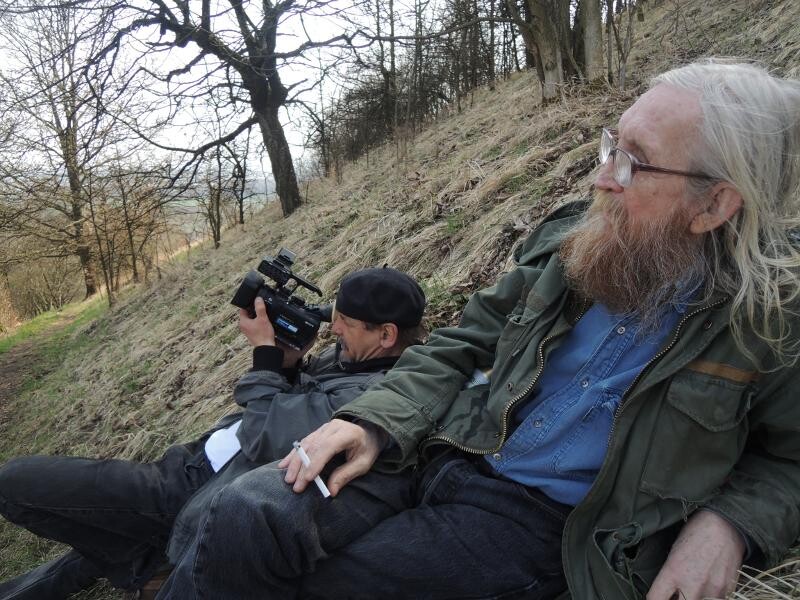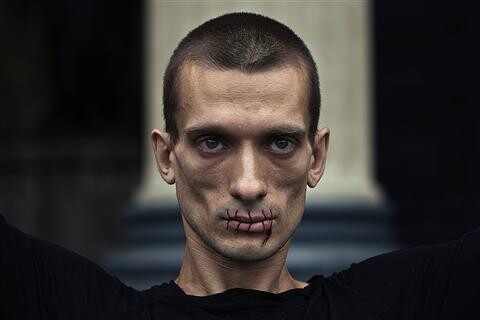To The Ravens of Vráťa Brabenec
"We began to meet in a pub in Vršovice - myself, my wife and Vráťa. We always left extremely refreshed from these meetings, and it was not due to drinking alcohol," says director Miroslav Janek in an interview about his new film, The Gospel According to Brabenec (Evangelium podle Brabence), which he hopes will affect the viewers in a similar beneficial manner as would the lively presence of the main protagonist.
The Gospel According to Brabenec is not a classic portrait. It opens with a clear recollection of exile, which clearly marks out the historical time, but the film soon drifts away from all the biographical data. How was this approach developed?
We tried to steer away from biographical data from the very beginning, perhaps not in a directive way, but more intuitively. Vráťa’s personal history served the purpose of allowing us to name concrete experiences, which were important to him personally. That means: member of the group Plastic People of the Universe, he was jailed and later kicked out of this country. That is all that you need to know.
What was the time horizon in which the film was shot?
In Febuary 2012 Renata Kalenská, who published a book of disscussions Evangelium podle Brabence (I), first approached me with the opportunity to make a film with Vráťa and planted a seed in my mind. We started going to a pub in Vršovice with Vráťa and began talking about it. All of us were in the mood to make a film. We filmed once in a while – with pauses it took approximately a year. Basically, we were together with Renata and Vráťa for twenty shooting days. We collected the material usually while travelling. As soon as we completed shooting the film I had to start working on the film Olga, which premiered this year in April. Although I had just completed shooting Vráťa, I stopped working on it and devoted my time to Olga.
What was the key to choosing your travel destinations?
The location was chosen because of its association to the relationship that began in discussions between Vráťa and Renata. They are not directly linked to Vráťa’s life, but to the dialogue that takes place.
The gas station in Mikulov was a very sophisticated choice in my opinion. A place that was important not only in terms of personal relationship history of Renata and Vráťa, but also due to the proximity of the Austrian border, and especially to emphasize the symbolic link between civilization and nature , which he continually points out. He’s sitting in the parking lot and with his discussion he is able to transcend it.
Mikulov is a gift for the dumb – that's me. A mad world of commerce, mindless shopping, the turmoil of the world today – and in the middle of it all Renata and Vráťa are immersed in a discussion in some kind of a time vacuum. He sits on an island surrounded by the fury of his environment and is trying to ascertain something about inner life. All the shooting at this location, which took five hours, was a gift for a different reason also. The weather changed about ten times that day. It poured, the sun was shining, and all sorts of conditions. This creates extremely attractive conditions for filmmakers.
Did you direct their dialog in any way?
I left it up to them. Sometimes I entered the dialogue with a comment, a nudge, but I did not direct the structure of the dialogue and I think Renata didn’t ether. She perhaps had points she wanted to address each day, but a lot of it came up spontaneously. Mainly because they were together.
What is the message of your film?
I always came refreshed from the pub in Vršovice and it wasn’t because of the alcohol we drank. The hours I spent with Vráťa always left me feeling happy about life. My wife Tonička, who sometimes accompanied us, experienced the same. In fact, after each evening we spent with Vráťa her back stopped aching. This is how I knew that Vráťa’s presence had a good influence – even therapeutic. It is possible that the only purpose of shooting the film was to capture the experience with Vráťa, transfer it to the screen and share it with the viewers.
This interview was published full-length in Czech in the Jihlava IDFF newspapers, dok.revue F01.
Translated by Floriana Skorulska



